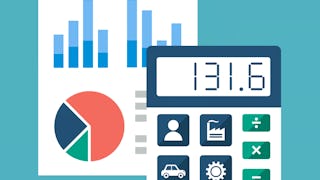L'essentiel du premier cours consiste à apprendre comment les entreprises enregistrent les coûts totaux et calculent les coûts unitaires pour leurs différents produits ou services. Par exemple, comment un constructeur automobile peut-il calculer les coûts d'une série de voitures ? Au cours des premières semaines, les participants apprennent ce que sont les coûts et comment les distinguer des dépenses ou des flux de trésorerie. Ils comprennent comment les entreprises enregistrent les coûts totaux et distinguent les types de coûts importants tels que les coûts des matériaux, les coûts du personnel ou l'amortissement. Au cœur de leur système de comptabilité analytique, les entreprises répartissent les frais généraux entre les différents produits. Nous montrons aux participants comment imputer les coûts encourus aux produits de l'entreprise et nous leur présentons les méthodes et les défis les plus importants du calcul du coût de revient des produits.

Profitez d'une croissance illimitée avec un an de Coursera Plus pour 199 $ (régulièrement 399 $). Économisez maintenant.

Les bases de la comptabilité analytique : Calcul du coût de revient des produits
Ce cours fait partie de Spécialisation Comptabilité analytique



Instructeurs : Gunther Friedl
18 994 déjà inscrits
Inclus avec
(180 avis)
Expérience recommandée
Ce que vous apprendrez
Vous apprendrez à rendre transparente la structure des coûts de votre entreprise et à enregistrer et calculer les coûts.
Vous apprendrez les méthodes de calcul des coûts des produits, c'est-à-dire la manière dont les entreprises calculent les coûts de leurs produits et services.
Vous apprendrez à choisir le système de calcul du coût de revient par produit le mieux adapté au programme et au type de production de votre entreprise.
Vous apprendrez à déterminer les taux de frais généraux pour l'imputation des frais généraux aux produits.
Compétences que vous acquerrez
- Catégorie : Allocation des ressources
- Catégorie : Comptabilité
- Catégorie : Dépenses d'exploitation
- Catégorie : Comptabilité analytique
- Catégorie : Comptabilité générale
- Catégorie : Amortissement
- Catégorie : Processus de production
- Catégorie : Planification des produits
- Catégorie : Gestion des coûts
- Catégorie : Comptabilité de gestion
Détails à connaître

Ajouter à votre profil LinkedIn
34 devoirs
Découvrez comment les employés des entreprises prestigieuses maîtrisent des compétences recherchées

Élaborez votre expertise du sujet
- Apprenez de nouveaux concepts auprès d'experts du secteur
- Acquérez une compréhension de base d'un sujet ou d'un outil
- Développez des compétences professionnelles avec des projets pratiques
- Obtenez un certificat professionnel partageable

Il y a 4 modules dans ce cours
Bienvenue à la comptabilité analytique ! Dans ce module, nous vous présenterons les concepts de base de la comptabilité analytique. Vous apprendrez ce qu'est la comptabilité analytique et comment elle est liée à la comptabilité d'entreprise. Ensuite, vous vous familiariserez avec certains termes de base de la comptabilité analytique qui sont essentiels pour les comptables analytiques. Enfin, nous vous présenterons un cadre qui distingue trois sous-systèmes de comptabilité analytique. Ce cadre nous guidera dans les modules suivants.
Inclus
9 vidéos6 lectures3 devoirs1 sujet de discussion1 plugin
Dans ce module, nous vous présenterons la comptabilité analytique de type - le premier des trois sous-systèmes de la comptabilité analytique. La comptabilité analytique aide les entreprises à rendre leur structure de coûts transparente. Elle permet aux entreprises d'avoir une vue d'ensemble des coûts encourus. Nous examinerons de plus près trois postes de coûts importants, à savoir les coûts des matériaux, les coûts du personnel et les coûts des machines. Vous apprendrez comment les entreprises les enregistrent et les calculent.
Inclus
8 vidéos5 lectures7 devoirs
Dans ce module, nous allons nous pencher sur la comptabilité analytique. La comptabilité analytique des centres de coûts permet de savoir où, c'est-à-dire dans quel centre de coûts, les frais généraux d'une entreprise ont été encourus. Elle fait le lien entre la comptabilité analytique et le calcul du coût de revient des produits en procédant à trois étapes d'imputation : Premièrement, les frais généraux de la comptabilité analytique de type sont affectés aux centres de coûts. Premièrement, les frais généraux de la comptabilité analytique sont affectés aux centres de coûts. Toutefois, en fin de compte, les comptables analytiques souhaitent affecter les coûts aux objets de coûts. Comme cela est plus facile pour les coûts des centres de coûts liés à la production ("centres de coûts directs") que pour les coûts des "centres de coûts indirects" tels que l'informatique ou la cantine, les entreprises répartissent d'abord les frais généraux des centres de coûts indirects vers les centres de coûts directs. Enfin, elles déterminent les taux de frais généraux pour l'imputation des frais généraux des centres de coûts directs aux objets de coûts. Dans ce module, nous vous présenterons chacune de ces étapes.
Inclus
10 vidéos2 lectures11 devoirs
Dans ce module, nous vous présentons l'évaluation des coûts des produits et des services. Le calcul du coût de revient des produits et des services fournit aux entreprises des informations sur les coûts des différents produits ou services. Il s'agit du dernier des trois sous-systèmes de comptabilité analytique. Nous nous contenterons parfois d'appeler le calcul du coût de revient des produits et des services "calcul du coût de revient des produits", mais il va de soi que certaines entreprises proposent des produits physiques tandis que d'autres offrent des services. Nous expliquons comment les entreprises conçoivent les systèmes de calcul du coût de revient des produits et nous vous familiarisons avec les principales méthodes de calcul du coût de revient des produits. Nous examinons également dans quelle mesure les méthodes de calcul des coûts sont adaptées aux différents processus de production et types de programmes. À cette fin, nous distinguerons la "production en atelier" de la "production de masse et par lots".
Inclus
12 vidéos3 lectures13 devoirs1 sujet de discussion3 plugins
Obtenez un certificat professionnel
Ajoutez ce titre à votre profil LinkedIn, à votre curriculum vitae ou à votre CV. Partagez-le sur les médias sociaux et dans votre évaluation des performances.
Instructeurs

Offert par
En savoir plus sur Finance

Coursera
 Statut : Essai gratuit
Statut : Essai gratuitTechnical University of Munich (TUM)
 Statut : Essai gratuit
Statut : Essai gratuitTechnical University of Munich (TUM)
 Statut : Prévisualisation
Statut : PrévisualisationUniversity of Virginia
Pour quelles raisons les étudiants sur Coursera nous choisissent-ils pour leur carrière ?




Avis des étudiants
180 avis
- 5 stars
75,13 %
- 4 stars
19,33 %
- 3 stars
3,31 %
- 2 stars
0,55 %
- 1 star
1,65 %
Affichage de 3 sur 180
Révisé le 22 déc. 2024
Concise and precise. Need to improve on the detailing part (in-depth).
Révisé le 7 mai 2023
An insightful course into the basics of cost accounting
Révisé le 24 mars 2024
Excellent Course with specific detailed information, really thank you

Ouvrez de nouvelles portes avec Coursera Plus
Accès illimité à 10,000+ cours de niveau international, projets pratiques et programmes de certification prêts à l'emploi - tous inclus dans votre abonnement.
Faites progresser votre carrière avec un diplôme en ligne
Obtenez un diplôme auprès d’universités de renommée mondiale - 100 % en ligne
Rejoignez plus de 3 400 entreprises mondiales qui ont choisi Coursera pour les affaires
Améliorez les compétences de vos employés pour exceller dans l’économie numérique
Foire Aux Questions
Pour accéder aux supports de cours, aux devoirs et pour obtenir un certificat, vous devez acheter l'expérience de certificat lorsque vous vous inscrivez à un cours. Vous pouvez essayer un essai gratuit ou demander une aide financière. Le cours peut proposer l'option "Cours complet, pas de certificat". Cette option vous permet de consulter tous les supports de cours, de soumettre les évaluations requises et d'obtenir une note finale. Cela signifie également que vous ne pourrez pas acheter un certificat d'expérience.
Lorsque vous vous inscrivez au cours, vous avez accès à tous les cours de la spécialisation et vous obtenez un certificat lorsque vous terminez le travail. Votre certificat électronique sera ajouté à votre page Réalisations - de là, vous pouvez imprimer votre certificat ou l'ajouter à votre profil LinkedIn.
Oui, pour certains programmes de formation, vous pouvez demander une aide financière ou une bourse si vous n'avez pas les moyens de payer les frais d'inscription. Si une aide financière ou une bourse est disponible pour votre programme de formation, vous trouverez un lien de demande sur la page de description.
Plus de questions
Aide financière disponible,


